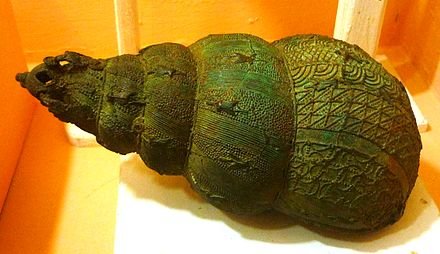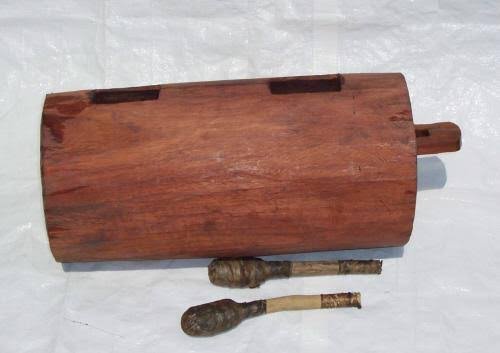The Peculiarity of The Igbo Music, Art and Literature
Hi everyone.
It is with great pleasure that I take the credit to bring to your reading pleasure a great aspect of my native culture, especially the art of music, literature, visual art, dance, and so on, and how their reflections shape our cultural values, beliefs, and identity.
As an Igbo man, one of the oldest cultures of the African heartland, there is more than enough material to apply when explaining our dynamic culture which is still very relevant in our time, though threatened by modernization, the values and reflections still stand.
Symbolic Road Clearing As An Art
The Igbo socio-political structure is designed in such a way that leadership is of the acephalous community base of family heads and not communal oligarchy or aristocracy. As such, the oldest man in the immediate family is responsible for family leadership with no fear or interference from external forces.
In the area of security, the age grade system and the younger generation who are mature enough take care to see to it that the trade route between their community and others is safe for business. Hence, they engage in road clearing.
There is also the art of initiation into manhood. When a boy attains a particular age and is mature to take the responsibility of a man, like having his own family and the likes, he is initiated into the group of the male gender who is now referred to as men. The initiation procedure is called Iwa-Akwa. That is a wearing-cloth ceremony.
The Ogene Music
Music and dance are pari-passu. They are inseparable. In the Igbo cultural domain, the Ogene music holds sway. This genre of music takes its name from the metal instrument of music called Ogene. The instrument is made up of metal by a blacksmith in the shape of a bell in a conical shape. It is the lead instrument in Ogene music. The iron body is beaten with a soft wooden stick which produces a very melodious sound, soothing to the ear and soul of those who care to listen.
Igbo music relies mostly on percussion instruments such as drums, gong, and flute which give out some special tempo, sound, and pitch when played.
The Udu is another musical instrument made of burnt clay (terracotta) in a pot shape which produces the bass sound in the Ogene music. This is very symbolic in Igbo music in all genres. This ingredient of culture can be traced back to as far as the era of the Nok culture of 1500 BC to 200 AD. The Igbo culture can be said to have been discussed from Igbo Ukwu and the Arochukwu climb into what it is today, spreading to almost every continent of the world where you find the Igbo people. They travel with their culture, music inclusive.


The Impact of Igbo Music on The People
Among many other effects of Igbo music on the people are the under-listed.
It guides historians as they take an account of the people they are writing or investigating.
Music played an integral part in labor and sports.
For pleasure, like when parents sing lullabies to their wards.
It brings a sacred ambiance to funerals and eulogies.
It enhances celebrations like the new Yam festival and child christening events.
The Igbo Art
This aspect of the Igbo culture is called Nka Ndi Igbo. Igbo art can be seen around artifacts, textiles, metal works, masks, and traditional figures. There is also pottery design as another beauty you don't want to miss when considering Igbo art.
The bronze metal works of the Igbo people are among the earliest for of civilization as they dated back as early as the ninth century. The narrow-mouth bottle design of the pottery work is another artwork of the people which has foretold how creative Igbo art has been. Beautification of the home front through pottery designs is very sacrosanct. The production of traditional beautiful pieces of art has declined because of Western culture overriding it. However, our relics can be found in top museums in the world as far as in the United Kingdom and Germany.



Woog carving and bronze metal works
Wood carving is another aspect we can study when it comes to Igbo arts. History has it that the Igbo people who dwelled on the shores of the river niger at the east might have been influenced by the Benin art of wood carving. As such, the aspect of Igbo art is dominant in the Awka region of today, eastern Nigeria.
Like the modern-day tattoo, the Igbo people also draw fine artwork on their skins for different purposes. The art is called Uli. The drawings are done both on human bodies and on buildings. They are not sacred in any form, they are just for beautification purposes. Despite the popularity of this aspect of the Igbo cultural identity, the Uli art started declining in 1970, after the Nigerian civil war that wreaked havoc on eastern Nigeria where the Igbo people hail from.
Igbo architecture for building mud houses with thatched roofs is another classical aspect of our rich culture. It is called Mbari. The Owerri-Igbo people were said to have developed this art and it spread all over Igboland.
The house often made with mud is designed in such a way that both humans abode, and shrines for traditional worship where the Alusi or deity are kept are somewhat synonymous. There were also buildings for the domestication of animals and farm produce. One popular house an ancient average Igbo man does not joke with is Oba'Ji or Yam Barn. That is the house that shows how relevant a man could be in society.
Igbo Literature
Before the modern age, the Igbo is seen in spoken or oral literature as can be seen in their poetry and folk songs. Before the late nineteenth century, oral literature was predominant among the people. In it, teaching of cultural heritage and passing the baton of a moral lifestyle was the order of the day.
Although Eurocentric writers have argued that African societies were non-literate, can anyone remove the fact that writing actually began in Africa?
To say the least, the Igbo people have a very rich cultural heritage, build around their beliefs and values and it has become a welcome ideal for other people because all the above mentioned has become very inviting and accommodation to other cultures. Here, I present to you, what I term as a summary of the large and wide culture of the Igbo people music, arts and literature.
I would like to invite to this content my friend @cool08 and wonderful African women @princessbusayo and @merit.ahama
To participate in this contest, kindly read up the rules Here


Congratulations @mrenglish! You have completed the following achievement on the Hive blockchain And have been rewarded with New badge(s)
Your next target is to reach 65000 upvotes.
You can view your badges on your board and compare yourself to others in the Ranking
If you no longer want to receive notifications, reply to this comment with the word
STOPCheck out our last posts:
Support the HiveBuzz project. Vote for our proposal!
Thank you
All good @mrenglish! You're a true Hive champion! Onward to that new goal!
BTW, our funding proposal is waiting for your support to continue bringing fun and badges to the Hive community.
All you need to do is to click on the "support" button on this page: https://peakd.com/proposals/248.
Thank you!
This is definitely one of my favorite tribes world over. Their dedication to their culture and traditions are second to none.
I still harbor plans of going back to spend some time there
Every tribe has a unique culture. The closer we get to them, the better we get to know.
Na real Igbo man you be oh! You really did a nice job representing the Igbo culture very well. Weldon sir. Ndewo. Daalu.
Thanks for sharing.
Igbo to the world.
The uniqueness of the culture makes it very difficult not to be noticed anywhere in the world.
I am proudly Igbo. That's the best gift nature gave me.
Hahaha 😄. You are right dear. Good morning.
Because you have done that of the Igbo people, I will narrow my own to the culture of my people. Arondizuogu.
Daalu. You did an amazing job getting your facts correctly written. Chop knuckle 😁😁
Thanks, ómó iyà.
You're such a fun to be around with.
Haha... So are you. Thank ya😉
Chop knuckle ... sounds vicious!
Haha... My fluffy Teng🤭🤭. Chop knuckle 😉.
A true son of the soil. You did well in representing our culture well nwannem nwoke. The instruments you showed are on point and helps others see the beauty in our heritage. Well-done.🌺
Thanks for coming around, nwannem.
that was really interesting, thanks.
as for the parochial eurocentric view that african cultures were illiterate, it's a view which was saw prevalant it still remains because most folks dont understand that passing culture orally is every bit as valid writing it down.
I agree with your perspective on Eurocentric thoughts about the African non-literate culture.
I loved working in West Africa, I found the culture absolutely fascinating, even from tribe to tribe things were so different!
!ALIVE
!LUV
@mrenglish, @tengolotodo(4/5) sent you LUV. | tools | discord | community | HiveWiki |
HiveWiki |  NFT | <>< daily
NFT | <>< daily
@mrenglish! You Are Alive so I just staked 0.1 $ALIVE to your account on behalf of @tengolotodo. (6/10)
The tip has been paid for by the We Are Alive Tribe through the earnings on @alive.chat, feel free to swing by our daily chat any time you want.

I hope to say the same for studying other people's culture.
Let me know whenever you come to West Africa again. I'd love to host you to my native soups 😂😂😂
Ah some soup, oh yes I will let you know!